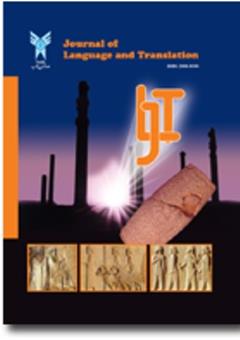A Study of O’Hara’s Poetry in the Light of Merleau-Ponty’s Philosophy of Nature
Subject Areas : All areas of language and translationBahare Aarabi 1 , Negar Sharif 2 * , Farid Parvaneh 3
1 - Department of English Language and Literature, Central Tehran Branch, Islamic Azad University, Tehran, Iran
2 - Department of English Language and Literature, Central Tehran Branch, Islamic Azad University, Tehran, Iran
3 - Department of English Language and Literature, Qom Branch, Islamic Azad University, Qom, Iran
Keywords: Chiasm, Eco-Phenomenology, Embodiment, The Flesh of the World, Urban Poetry,
Abstract :
This study aims to utilize Maurice Merleau-Ponty's environmental phenomenology in analyzing the chosen poems written by Frank O'Hara, a significant figure in the New York School of Poetry.' Eco-phenomenology 'is where philosophy and ecology meet. Encouraging to review the traditional beliefs of Western philosophy about nature, this relatively new vogue of criticism deals with environmental issues from a phenomenological perspective. This article aims to analyze several poems by Frank O'Hara from the New York School of Poetry through the lens of eco-phenomenology. The goal is to challenge the perception that this poetic movement is solely urban and lacks awareness of the natural environment. By highlighting a divide within this poetry that demonstrates an understanding of a wider phenomenological world, encompassing both humans and non-humans, we aim to refute the notion of reductive urbanism. Being a Critique of Cartesian mind-body dualism and the anthropocentric perspective resulting from it, this study applies the chiasmic ontology of Merleau-Ponty to the selected poems. The present research demonstrates that O'Hara's poetry exhibits a prevailing mutual participation between human flesh and the 'flesh of the world', as described by Merleau-Ponty's concept of chiasm, particularly during moments of perception. This study examines how O'Hara's work demonstrates the concept of 'body', a crucial term in Merleau-Ponty's philosophy, and how this demonstration leads to the development of an eco-phenomenological perspective in his urban poetry. Conducting both textual and contextual analyses, this research brings to the fore O’Hara’s eco-consciousness and his vision of interrelations governing the universe, despite his embracing urban life.
Abram, D. (2010). Becoming Animal: An Earthly Cosmology. 1 Vol. In: Toronto: Random House.
Abram, D. (2012). The spell of the sensuous: Perception and language in a more-than-human world. Vintage.
Brossard, O. (2009). " The/profile of a city/exploding": Frank O’Hara’s Aesthetics of Shock. Caliban. French Journal of English Studies(25), 215-228.
Campbell, R. (2015). A Little Reminder of Immortal Energy: Frank O’Hara’s Poetics of Colour.
Carman, T. (2008). Merleau-ponty. Routledge.
Cran, R. (2016). Collage in Twentieth-Century Art, Literature, and Culture: Joseph Cornell, William Burroughs, Frank O’Hara, and Bob Dylan. Routledge.
Emmerling, L. (2003). Pollock. Taschen.
Gray, T. (2010). Urban Pastoral: Natural Currents in the New York School. University of Iowa Press.
Langer, M. (2003). Nietzsche, Heidegger, and Merleau-Ponty. Eco-Phenomenology back to the Earth Itself, 103-120.
Mattix, M. (2011). Frank O'Hara and the Poetics of Saying'I'. Fairleigh Dickinson.
Merleau-Ponty, M. (1964). Cezanne's Doubt Maurice Merleau-Ponty. Northwestern University Press Evanston, Ill.
Merleau-Ponty, M. (1968). The visible and the invisible: Followed by working notes. Northwestern University Press.
Merleau-Ponty, M. (2007). The Merleau-Ponty Reader. Northwestern University Press.
Merleau-Ponty, M. (2012). Eye and mind. In Theatre and Performance Design (pp. 243-245). Routledge.
Merleau-Ponty, M. (2013). Phenomenology of perception. Routledge.
Mildenberg, A. (2017). Modernism and Phenomenology: Literature, Philosophy, Art. Springer.
Morris, D. (2010). Empirical and phenomenological studies of embodied cognition. In Handbook of phenomenology and cognitive science (pp. 235-252). Springer.
O'Hara, F. (1995). The collected poems of Frank O'Hara. Univ of California Press.
Rapatzikou, T. G. (2017). James Schuyler’s Flower Poems and the Urban Pastoral Aesthetic. Contesting Environmental Imaginaries: Nature and Counternature in a Time of Global Change, 28.
Schreyach, M. (2013). Pre-objective Depth in Merleau-Ponty and Jackson Pollock. Research in phenomenology, 43(1), 49-70.
Smith, H. (2000). Hyperscapes in the Poetry of Frank O'Hara: Difference, Homosexuality, Topography. Liverpool University Press.
Whalen-Bridge, J., & Storhoff, G. (2009). The Emergence of Buddhist American Literature. State University of New York Press.
Widger, E. (2017). Walking women: Embodied perception in romantic and contemporary radical landscape poetry. Journal of British and Irish Innovative Poetry, 9(1), 1-31.

